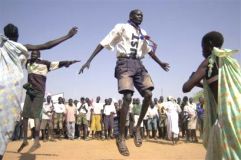Khartoum goes gay over southern Sudan peace deal
KHARTOUM, Sudan, Jan 10, 2005 (PANA) — Sudanese, particularly those hailing
from the southern region, Monday took to the streets here
celebrating the signing Sunday of a peace deal to end over two
decades of fighting between the Khartoum government and rebels in
the south.

|
|
Southern Sudanese dancing groups take part in peace celebrations in Juba, Sudan, Monday, Jan 10, 2005. (AP). |
From dawn they danced, sang and performed prayers as they waited
at the Green Square in anticipation of an address to be delivered
via telephone by the rebel Sudan People’s Liberation
Movement/Army (SPLM/A) leader John Garang from Nairobi, Kenya.
Garang and Sudanese Vice President Ali Osman Taha signed the
peace agreement in Nairobi, Kenya at ceremonies witnessed by a
number of African and world leaders instrumental in forging
concessions between the two parties to end Africa’s longest
running civil war.
The war pitted the government against the southern rebels seeking
greater autonomy and more of the country’s wealth for the region,
at the price of two million lives, while some four million others
were uprooted from their homeland.
The fighting first began in the 1950s and a fragile peace accord
was reached in 1973, but the civil re-ignited 10 years later when
Khartoum tried to impose Islamic law on the mainly Christian and
animist south.
Jubilant citizens chanting slogans and carrying banners that
read: “Long live a United Sudan”, “Welcome to a new Sudan”, “We
want Peace and Justice” overwhelmed parts of the city in a
generally peaceful atmosphere.
“What is important is that the living conditions of the people
should improve… Sudan is blessed with natural resources, long-
flowing rivers, and a fertile land,” Mohammed Galadari told PANA
almost breathless.
But a somewhat sceptical Ali Mohammed, 34, said: “Our hope is
that the present agreement will not meet the fate of the 1973
pact, reached in Addis Ababa (Ethiopia) that was declared void in
a matter of 10 years”.
Journalist Mayom Alier was more optimistic, declaring, “This
agreement marks the end of an era and the beginning of another”.
The accord provides a range of consensus including sharing of the
country’s wealth, division of power, limited autonomy for
southern Sudan, military roles for the conflicting parties and
religious tolerance, among others.
Majok Nikdemo Arou, a reporter and translator, described the
unfolding peace in Sudan as “a land mark shift” since
independence, adding: “Though some Sudanese political forces felt
left out in the cold, the peace will spread its wings to Darfur
and others over a period of time”.
Obiad Morrwah, 43, said that the signing of the peace accord was
“a historical event” because it ended one of the Africa’s
longest-running civil wars and put Sudan on “a good footing…
for a new future of peace, stability, liberty and justice”.
Dr Ahmed Al Tigani said the agreement was “indeed a leap into a
brighter future” providing for political, social and economic
“regeneration” in the country.
Makki Hassan Abu Garja, columnist and author of ‘Jews in Sudan’,
noted that Sudanese were generally “anxious for peace” after more
than 20 years of civil war that claimed some 2 million lives.
“Although I have an opposing point of view (regarding certain
aspects of the agreement), the signing of this accord… is a
great initiative in the history of the nation,” Garja noted.
Ghada Hatim, a communication and marketing liaison officer, urged Sudanese to see the agreement as “a new beginning that would pave the way for us to build our country for the next generation”.
